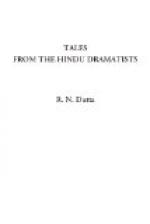“Remember that a king’s real glory consists in his people’s welfare.”
Rama replies: “I am ready to give up everything, happiness, love, pity—even Sita herself—if needful for my subjects’ good.”
In accordance with this promise, he employs an emissary named Durmukha to ascertain the popular opinion as to his own treatment of his subjects.
Lakshmana now asks Rama and Sita to come out and see their early history drawn on the terrace of the palace. They move about and the different parts of the picture are shown to Sita, when the eyes of Sita turn on the ‘yawn-producing’ weapons. Rama asks her to salute them so that they would attend also on her children. Sita then feels tired and lays her head on the arm of her husband and sleeps.
Then Durmukha, who, as an old and trusted servant, had free admission to the inner apartments, comes and whispers to him that people condemn his receiving back a queen, abducted by a fiend, after her long residence in a stranger’s house. In short, he is told that they still gossip and talk scandal about her and Ravana. The scrupulously correct and over-sensitive Rama, though convinced of his wife’s fidelity after her submission to the fiery ordeal, and though she is now likely to become a mother, feels himself quite unable to allow the slightest cause of offence to continue among his subjects.
He has no other resource. People must be satisfied. He orders his dear Sita’s exile, and the messenger goes away to deliver the order to Lakshmana to seclude her somewhere in the woods. He is torn by contending feelings. He is overpowered with grief, withdraws his arm from his sleeping wife and pours forth pathetic lamentation. Then he takes up her feet and cries when the announcement of the arrival of frightened Rishis makes him go out to send Satrughna to their succour. The messenger Durmukha then enters and takes Sita unsuspectingly to mount the chariot which is to lead her to exile.
Lakshmana takes Sita to the forest and leaves her there.
She is protected by divine agencies. Her twin sons, Kusa and Lava, are born and entrusted to the care of the sage Valmiki, the author of the Ramayana, who brings them up in his hermitage. The boys have no knowledge of their royal descent.
An incident now occurs which leads Rama to revisit the Dandaka forest, the scene of his former exile. The child of a Brahman dies suddenly and unaccountably. His body is laid at Rama’s door. Evidently some national sin is the cause of such a calamity, and an aerial voice informs him that an awful crime is being perpetrated; for a Sudra, named Sambuka, is practising religious austerities, instead of confining himself to his proper vocation of waiting on the twice-born castes. Rama instantly starts for the forest, discovers Sambuka in the sacrilegious act and strikes off his head. But death by Rama’s hand confers immortality on the Sudra, who appears as a celestial spirit, and thanks his benefactor for the glory and felicity thus obtained.




